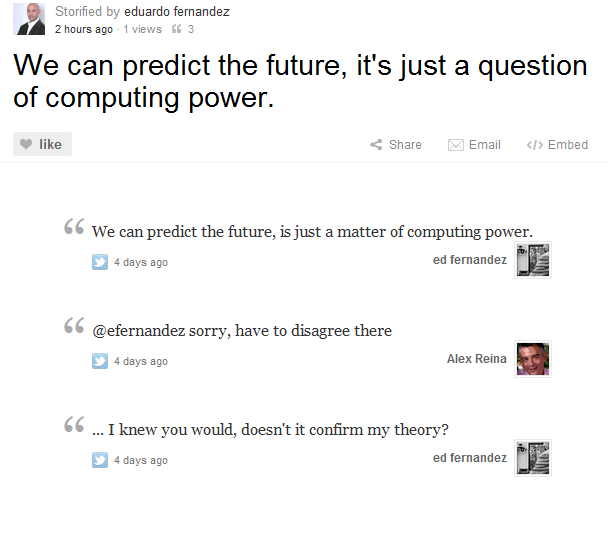We can predict the future, it is just a question of computing power.
"...Future can be seen? Come on!, this is just another headline purposely made up to draw attention on ads or something else" Yes, it is, and I carefully selected the words in this tweet before posting it to trigger that sort of rejection, and, as I predicted... It happened.
Therefore, based on this simple logic, future can be predicted to a certain extent, although with many limitations, but, it is a fact.
My brain could predict reactions from my twitter audience to that original statement, however, because of my own brain computing power limitations, I cound't predict who of my 2700+ followers would be the first to deny and reply my tweet.
Being said that, it's just a question of thorough analysis of my followers, their profile, interests and activity, that I could come up with an statistical prediction of who could have responded back first. With more computing power I could tweet, predict reactions and estimate who would reply and even what he or she would say.
Haven't you ever been in a situation with your other half or an old friend knowing exactly what she or he was going to say, think or do?.
Similarly, in the wireless industry for instance, we very much apply a 'reverse engineering' management approach both to competitors and other parties, tracking down actual offers, prices, market shares, and extrapolating the top-down objectives of those companies which, in turn, help predict market behaviour and leads to a fact based sales forecast.
The more data you have, and the more you analyze and compute, the better forecast accuracy.
So, more data (Big Data) + more computing power (Moore's Law) = better accuracy in future predictions, and this is exactly the point.
The web, internet, cloud or whatever you may want to call it is growing exponentially in terms of available digital data (big data), storage, infrastructure, and intelligence (interconnected apps and services) all converging in our personal portable communication devices (smartphones), and all of these glued together will give us increasing and pervasive computing power, with nearly infinite data points to help us predict the future.
If we extrapolate and apply this rationale to physics, considering it is all about matter, and matter components down to individual atoms, moving around forming our past, present, and future [*forget about time, it is just an illusion we humans build up as part of our limited perceptions to understand matter behavior] then, if we only could have sufficient computer power, we could probabilistically build all potential future scenarios of matter formation and determine statistically the most likely ones, based on historical patterns, carefully reverse engineered.
I need to work in that super-cloud-machinery, but first, I'll make sure we all get our hands on a smartphone ;-)
